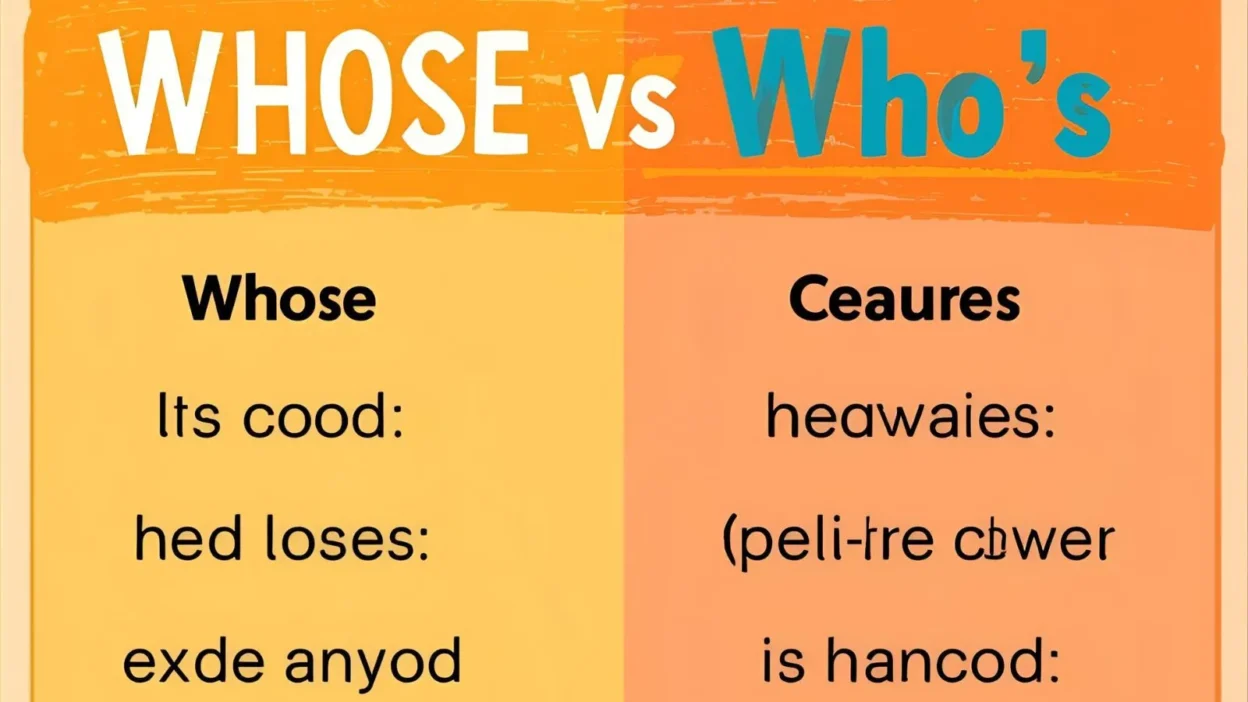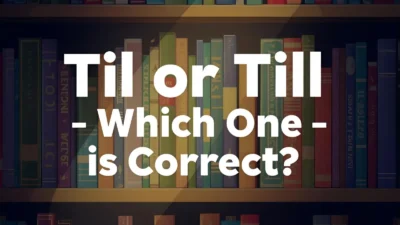English learners and even native speakers often find themselves pausing mid-sentence, wondering: Is it “whose” or “who’s”?
This confusion is common because both words sound identical, yet their meanings and uses are completely different.
People frequently search for “whose vs who’s” to clear up mistakes in essays, emails, or professional communication.
Understanding this difference is more than just grammar—it ensures clarity and confidence in writing.
While “whose” shows possession, “who’s” is simply a contraction of “who is” or “who has.” Misusing them can create awkward sentences or change meaning entirely.
In this article, we’ll break down the difference with simple rules, history, British vs American usage, examples, and common mistakes.
By the end, you’ll never hesitate over “whose vs who’s” again.
Whose vs Who’s – Quick Answer
- Whose = shows ownership.
✅ Example: Whose book is this? - Who’s = short form of “who is” or “who has.”
✅ Example: Who’s coming to the party?
👉 If you can replace it with “who is” or “who has”, use who’s. Otherwise, use whose.
The Origin of Whose vs Who’s
- Whose comes from Old English hwæs, meaning “of whom” or “belonging to whom.”
- Who’s is a modern contraction that developed for speed in spoken English.
- The spelling confusion exists because English contractions use apostrophes, while possessive pronouns (like whose) do not.
British English vs American English Spelling
Both British and American English use whose and who’s the same way. However, slight differences appear in writing style:
| Usage | British English | American English |
| Possession | Whose car is parked outside? | Whose car is parked outside? |
| Contraction | Who’s at the door? | Who’s at the door? |
| Formal writing | More likely to use full “who is” | Often comfortable with “who’s” |
👉 The rules don’t change, but tone and formality may differ.
Which Spelling Should You Use?
- US audience → Both forms are acceptable, but contractions (“who’s”) are widely used in casual and professional writing.
- UK/Commonwealth audience → Contractions are common, but formal documents may prefer “who is.”
- Global communication → Stick to the standard: “whose” for possession, “who’s” for contractions.
Common Mistakes with Whose vs Who’s
- ❌ Who’s bag is this?
✅ Whose bag is this? - ❌ Whose going to the meeting?
✅ Who’s going to the meeting? - ❌ I don’t know who’s keys these are.
✅ I don’t know whose keys these are.
Whose vs Who’s in Everyday Examples
- Email: Whose documents should I review before the deadline?
- News: Who’s responsible for the policy changes?
- Social media: Who’s excited for the weekend?
- Formal writing: Whose responsibility is it to ensure compliance?
Whose vs Who’s – Google Trends & Usage Data
- Searches for “whose vs who’s” peak during exam seasons and grammar study periods.
- Popular in US, UK, India, Canada, and Australia.
- In professional writing, “whose” appears more often, while casual platforms (social media, blogs) show higher use of “who’s.”
Comparison Table – Whose vs Who’s
| Word | Function | Meaning | Example |
| Whose | Possessive pronoun | Belonging to whom | Whose phone is ringing? |
| Who’s | Contraction | Who is / Who has | Who’s calling me now? |
FAQs
1. What is the easiest way to remember the difference?
👉 If you can replace it with “who is” or “who has,” use “who’s.” Otherwise, use “whose.”
2. Is “who’s” ever possessive?
👉 No. Only “whose” shows possession.
3. Can I use “who’s” in formal writing?
👉 In very formal documents, write “who is” instead.
4. Is “whose” only for people?
👉 No, you can use it for things too: Whose book is this?
5. Do British and American English use them differently?
👉 No difference in rules—just slight differences in style.
6. Why do people confuse them?
👉 They sound the same, but have different meanings and spellings.
7. Which is more common in daily speech?
👉 “Who’s” is more common in conversation; “whose” is common in questions.
Conclusion
The confusion between “whose” and “who’s” is natural because they sound alike, but their meanings are different. Whose always shows ownership, while who’s is a contraction for “who is” or “who has.” Misusing them can weaken your writing, whether in exams, emails, or professional reports.
For clarity:
- Use whose for possession.
- Use who’s when you mean “who is” or “who has.”
By practicing with examples and checking your sentences, you’ll soon master this pair. Next time you write, you won’t hesitate over whose vs who’s—you’ll choose the right word with confidence.
Discover More Articles:
- 101+Wich vs Which Understanding the Correct Spelling 2026
- 101+Curtesy or Courtesy Which One Is Correct? 2026
- 101 + Til or Till Which One Is Correct? 2026
- 101 + Quite or Quiet What’s the Difference and How to Use Them? 2026



